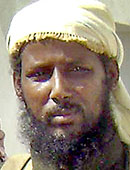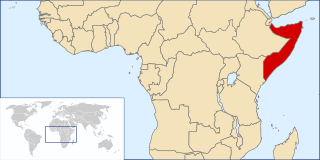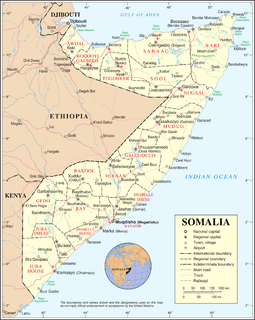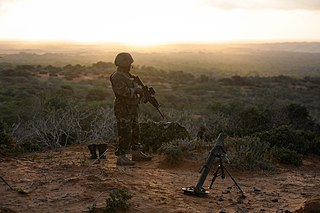Related Research Articles

The African Union Mission in Somalia (AMISOM) is an active, regional peacekeeping mission operated by the African Union with the approval of the United Nations Security Council. It is mandated to support transitional governmental structures, implement a national security plan, train the Somali security forces, and to assist in creating a secure environment for the delivery of humanitarian aid. As part of its duties, AMISOM also supports the Federal Government of Somalia's forces in their battle against Al-Shabaab militants.

Sheikh Mukhtar Robow, also known as Abu Mansur, is a former deputy leader and former spokesman of the Somali militant group Al-Shabaab.

The 2009 timeline of events in the Somalia War (2006–2009) during January 2009 is set out below. From the beginning of February the timeline of events in the Somali Civil War (2009–present) is set out following the conclusion of the previous phase of the civil war.

The 2009–present phase of the Somali Civil War is concentrated in southern and central Somalia and portions of north eastern Kenya. It began in early February 2009 with the conflict between the forces of the Federal Government of Somalia, assisted by African Union peacekeeping troops, and various militant groups and factions. The violence has displaced thousands of people in the southern part of the country. The conflict has also seen fighting between the Sufi Ahlu Sunna Waljama'a and Al-Shabaab.

The Battle of Mogadishu (2009) started in May with an Islamist offensive, when rebels from al-Shabaab and Hizbul Islam attacked and captured government bases in the capital of Mogadishu. The fighting soon spread, causing hundreds of casualties, and continued on at various levels of intensity until October. The battle's name usually includes the year, when referenced, in order to distinguish it amongst the nine major Battles of Mogadishu during the decades long Somali Civil War.

The 2009 Hotel Shamo bombing was a suicide bombing at the Hotel Shamo in Mogadishu, Somalia, on 3 December 2009. The bombing killed 25 people, including three ministers of the Transitional Federal Government, and injured 60 more, making it the deadliest attack in Somalia since the Beledweyne bombing on 18 June 2009 that claimed more than 30 lives.

The Battle of Mogadishu (2010–11) began on 23 August 2010 when al-Shabaab insurgents began attacking government and African Union Mission to Somalia (AMISOM) positions in the Somali capital of Mogadishu. Al-Shabaab began its offensive after its spokesman said the group was declaring a "massive war" on troops sent by AMISOM, describing its 6,000 peacekeepers as "invaders". In December 2010 the number of AMISOM troops was increased to 8,000 and later to 9,000. The battle's name usually includes the years, when referenced, in order to distinguish it amongst the nine major Battles of Mogadishu during the decades long Somali Civil War.

Noramfaizul Mohd Nor was the first journalist from Malaysia to be fatally injured while on a dangerous assignment abroad. The attack occurred on 2 September 2011 in Mogadishu, Somalia, while Noramfaizul was reporting for Bernama TV on a humanitarian mission organised by the Islamic charity Kelab Putera 1Malaysia. An AMISOM investigation later concluded that he was accidentally killed by one of its peacekeepers while travelling in a Malaysian convoy.
Sheikh Nur Mohamed Abkey was a Somalian journalist killed in the line of duty. Abkey worked for Radio Mogadishu-Voice of Somali Republic in Somalia's capital city. He had a long career as a journalist and worked under difficult conditions during the last two decades of his career.

This is a 2012 timeline of events in the Somali Civil War (2009–present).
Abdi Jeylani Malaq Marshale, also known as Abdi Jeylani Malaq or Abdi Jeylani Marshale, was a popular comedian on both radio and TV from Somalia who was targeted by Al-Shabaab militants and later assassinated in Mogadishu.
Abukar Hassan Mohamoud, also known as Kadaf, was a Somali activist and the manager/director for the independent Somaliweyn Radio in Mogadishu, Somalia. At the time of his murder, he had been working on a re-launch of Radio Somaliweyn, which had been attacked and looted by Al-Shabaab in 2010.
Warsame Shire Awale was a prominent Somali poet, playwright and songwriter. He was assassinated in Mogadishu, Somalia's capital, becoming the 18th media figure killed in the country in 2012. Islamist militants Al-Shabaab are believed to have been behind most of the murders.

HornAfrik Media Inc, a defunct news organization based in Mogadishu, was subjected to various attacks by militants during the Islamist insurgency (2006-2009) in southern Somalia. Prior to the company's closure in 2010, these incidents included:

This is a 2014 timeline of events in the Somali Civil War (2009–present).

Operation Indian Ocean was a joint military operation between the Somali military, AMISOM and the United States military against the Al-Shabaab militant group in southern Somalia. It officially began in August 2014.

This is a 2015 timeline of events in the Somali Civil War (2009–present).
This article contains a timeline of events for the Somali militant group Al-Shabaab.
Despite the “vibrant media culture” in Somalia – which hosts more than 90 media outlets and scores of websites and blogs – numerous violations aimed at journalists and political leaders are documented, including killings, attacks, arbitrary arrests and detention, intimidation, harassment, closure of media outlets, confiscation of equipment and blocking of websites
References
- ↑ Ibrahim, Mohommed (31 August 2010). "Somalia: Radio Reporter is Killed". New York Times. Retrieved 19 October 2012.
- 1 2 "Barkhat Awale – Journalists Killed". Committee to Protect Journalists. Retrieved 20 October 2012.
- 1 2 3 4 "Journalist killed in Mogadishu fighting, Al-Shabaab takes control of radio station". Reporters Without Borders. 26 August 2010. Retrieved 19 October 2012.
- 1 2 3 4 "Burkhat Awale". Committee to Protect Journalists. 24 August 2010. Retrieved 19 October 2012.
- 1 2 "NUSOJ Mourns as Mogadishu violence claims the life of veteran Journalist". African Democracy Forum. 24 August 2010. Retrieved 19 October 2012.
- ↑ "46 Journalists Killed in Somalia since 1992/Motive Confirmed". Committee to Protect Journalists. Retrieved 19 October 2012.
- ↑ "Intense Violence Against Journalists in Somalia". www.salem-news.com. 4 September 2010. Retrieved 19 October 2012.
- ↑ "IFJ Warns of Grave Danger to Media in Somalia after Death of Veteran Journalist". International Federation of Journalists. 24 August 2010. Archived from the original on 15 April 2013. Retrieved 19 October 2012.
- ↑ "UNESCO Director-General deplores death of Somali journalist Barkhad Awale Adan". UNESCO. 27 August 2010. Retrieved 19 October 2012.